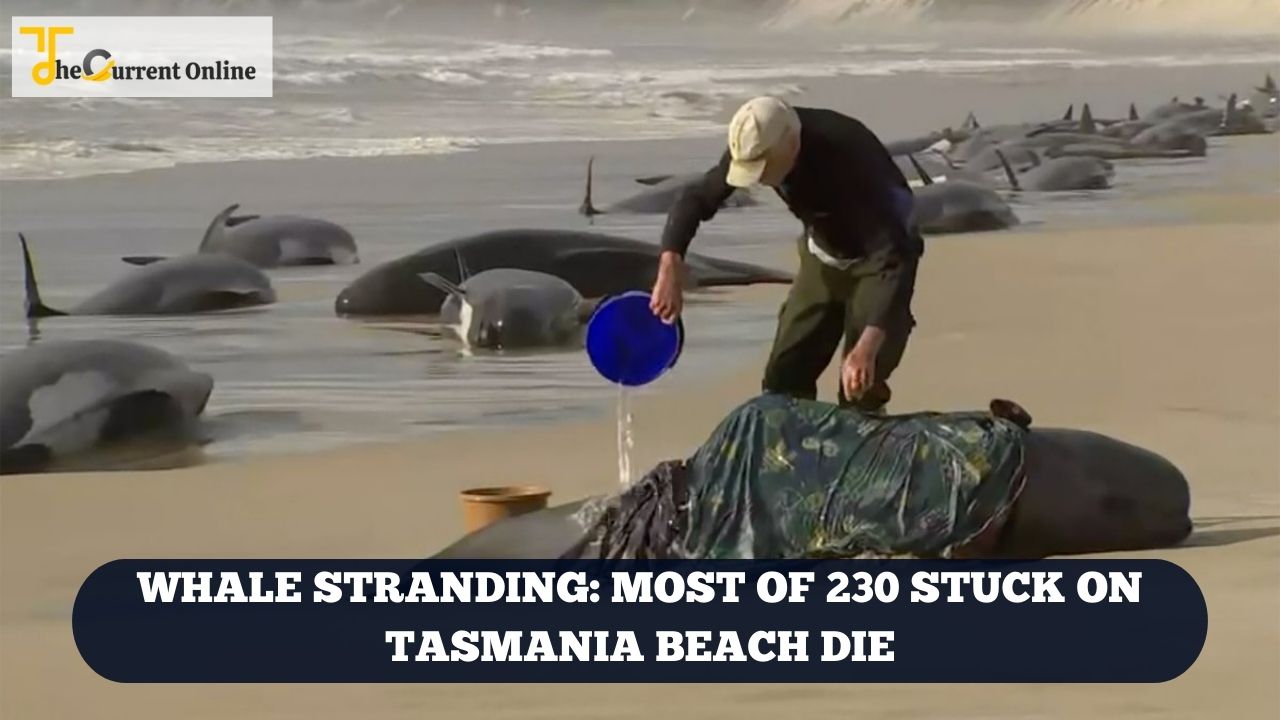Even though nearly 200 stranded pilot whales died off Tasmania’s west coast, rescuers successfully returned 32 animals to deeper water on Thursday.
On Wednesday, a roughly 230 pilot whales pod was stranded on Ocean Beach, west of Strahan. Others were stuck on a sand flat inside Macquarie Harbour, south of town.
On Wednesday, marine environmentalists initiated a rescue mission, which lasted all day Thursday.
“Dozens of whales have been recovered and transported to deeper water,” said Sam Gerrity of Southwest Expeditions, engaged in the rescue and release operation.
Authorities reported on Thursday morning that only 35 of the 230 cetaceans on Ocean Beach had survived. Brendon Clark, the incident commander, announced Thursday afternoon that 32 of the 35 animals had been rescued.
“We still have three animals surviving on the northern end beach, but due to access difficulties, mostly tidal factors, we just haven’t been able to get those three animals safely today,” Clark said.
“Throughout the day, we’ll switch to corpse recovery and disposal activities.”
Clark stated that the exposed conditions on Ocean Beach led to the high fatality rate and that officials restricted volunteer participation to those with prior marine wildlife training or experience.
“We appreciate all of the offerings and goodwill conveyed by the community.” It’s more about providing a safe working environment and skilled and trained staff.”
Clark stated that the environmental circumstances on Ocean Beach were significantly more severe than in the estuary, where another major stranding event occurred two years ago.
My thoughts are with those helping the remaining alive pilot #whales through the night. The clock is ticking and hopefully if safe, we will see some animals be returned to sea tomorrow. Best of luck 🤞 #Tasmania #stranding @abcnews https://t.co/psKAaMSOd9
— Dr. Vanessa Pirotta (@VanessaPirotta) September 21, 2022
Four hundred seventy long-finned pilot whales were discovered beached on sandbars and trapped inside the heads of Macquarie Harbour in 2020, the worst mass stranding in Australian history. “The creatures were pretty much half-floating last time,” Clark added. “They had a certain buoyancy.”
Authorities have warned Macquarie Harbour vessel operators to look for potential strandings at other locations. “We will conduct patrols ourselves by air reconnaissance and watercraft,” Clark continued.
“We are aware that some of them may re-beach themselves, and we will keep an eye on it,” Clark added. “There have been sightings of whales within the harbor precinct, although they appear to be free swimming.”
The mass stranding is the second in a matter of days. On Monday, 14 deceased sperm whales, all immature males, washed ashore on King Island in the Bass Strait.
“It’s pretty worrying that these animals have stranded… at the same time,” Dr. Olaf Meynecke of Griffith University’s coastal and marine research department said, adding that the two incidences were most likely not coincidental.
“They eat comparable prey, such as giant squid from the continental shelf.”
FAQs
Why do whales die on the beach?
A single, live animal beaching is frequently the result of illness or injury. Beachings are also caused by bad weather, old age, navigation errors, and hunting too near the shore. Some whale and dolphin species are more vulnerable to mass beachings than others. The most typically impacted species are toothed whales (Odontoceti).
Do whales die by beaching themselves?
Cetacean stranding, also known as beaching, is a phenomenon in which whales and dolphins become stranded on land, most typically on a beach. Beached whales frequently die from dehydration, collapsing under their weight, or drowning when the blowhole is covered by high tide.
Do the majority of beached whales perish?
Stranding of cetaceans frequently results in mortality due to dehydration. Whales have a colossal coating of insulating fat. They overheat and lose too much water through evaporation from their lungs if they don’t have water to keep them cool.
How do the majority of whales die?
Natural Factors
Cetaceans can die merely of old age. The lifespan of harbor porpoises ranges from a few decades to over 200 years for bowhead whales. They may also perish due to predation by killer whales, polar bears, or sharks.
